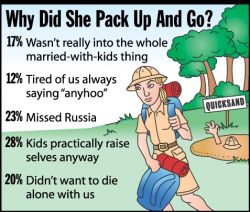From The Economist
Jan 13th 2005
WOMEN live longer than men. It is unfair, but true. In developed countries, the average difference is five or six years. In the poor world the gap is smaller, owing to the risks of childbirth. But nowhere is it absent. The question is, why?
That question can be answered at two levels. An evolutionary biologist would tell you that it is because women get evolutionary bonus points from living long enough to help bring up the grandchildren. Men, by contrast, wear themselves out competing for the right to procreate in the first place. That is probably true, but not much help to the medical profession. However, a group of researchers at John Moores University, in Liverpool, England, has just come up with a medically useful answer. It is that while 70-year-old men have the hearts of 70-year-olds, those of their female peers resemble the hearts of 20-year-olds.
David Goldspink, who revels in the title of Professor of Cell and Molecular Sports Science at John Moores, and his colleagues looked at 250 volunteers aged between 18 and 80 over the course of two years. All the volunteers were healthy but physically inactive. The team's principal finding was that the power of the male heart falls by 20-25% between the ages of 18 and 70, while that of the female heart remains undiminished.
Each volunteer's heart function was measured before exercise and at peak exertion on a treadmill. In particular, the researchers measured blood flow and blood pressure. Their subjects were also given an ultrasonic scan to measure the size of the chambers of their hearts, the thickness of the heart's muscular wall, and its filling and emptying actions.
The researchers found that between the ages of 20 and 70, men lose one-third of the contractile muscle cells in the walls of their hearts. Over the same period, women lose hardly any contractile cells. There is a strong link between the number of these cells and the function of the heart. What remains a mystery is why men lose these cells and women do not.
A previous theory of why women outlive men suggested that the female sex hormone, oestrogen, could have a protective effect on the heart. But Dr Goldspink dismisses this idea, saying that there is no discernible drop-off in female heart function after menopause, when oestrogen levels decrease dramatically. However, oestrogen does have a beneficial effect on blood vessels. The study found that blood flow to the muscles and skin of the limbs decreases with age in both sexes. The changes in the structure of the blood vessels occur earlier in men, but women catch up soon after menopause.
It's not all bad news for men, though. In a related study, the team found that the hearts of veteran male athletes were as powerful as those of inactive 20-year-old male undergraduates. But can men really recover lost heart function after a lifetime of inactivity and poor diet? Is it ever too late to start exercising? "I think the answer is no," says Dr Goldspink. "The health benefits to be gained from sensible exercise are to be recommended, regardless of age."


No comments:
Post a Comment